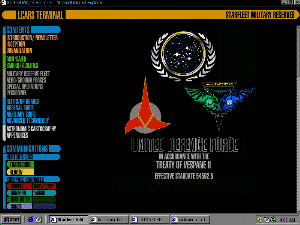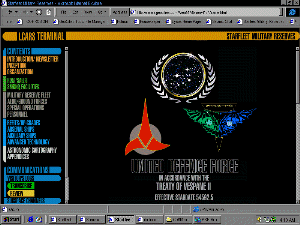|
As this site is free, I do not have enough room to make a nonframes version. If your browser can't support frames, you know the obvious answer.
ATTENTION Netscape Users
The Netscape browser may disable this sites's HTML tags for paragraph justification and margin settings. In other words, it will not look as neat as it does with Internet Explorer.
ATTENTION Internet Explorer Users
This site will not download as fast as Netscape, but it will look much better.
Links,Updates, and Awards opening in this page.
Links,Updates, and Awards opening in a new window.
Star Trek Essays My opinions concerning some important issues in the Trek Universe.
|
Graphics Intensive Site!
Site uses navigation maps heavily.
Based on STAR TREK, created by Gene Roddenberry
And we all know that Paramount and Viacom OWN Star Trek.
I'm not trying to make a buck with this site.
If this site meets your standards as a site you would like to hyperlink, please feel free to use the top banner.
Anyone wishing to create a sim group or write fan fiction based on the Military Reserves, please feel free to do so.
 Visitors Visitors
1128 Visitors on previous server host.
|
Working in cohoots with. . .

The Behaviour Group's STZone has become famous for bringing you Trek information. The Secure Channel is the Official Newsletter of this website, bringing to you news and spoilers on the upcoming Trek episodes, plus information on the STZone's latest news. E-mail subscriptions are available as well--which is easier than filling out Guestbook forms!
The midi "Vanguard" composed by my good friend Infinity Squared.
Armageddon Forever...
Souls of Shadows
___
It all started back in the summer months
(I think) of 1997 when someone posted an advertisement for their website on the Utopia Planitia forum. I must admit I didn't pay too close attention to it. But I asked a question about whether there were special forces in Star Trek a month or two later. I remember still as if it was yesterday a guy by the name of David Highlander responding that he did fan fiction on the premise of an organization in Starfleet that did just that. I looked
at his site. From there I was hooked.
___
I read every story he posted intently
enveloped in the sheer logic of his concept. "Why hadn't Starfleet seen the light?" I asked myself. Here we are in the twentieth century. We use computers, lasers, explosives, parachutes, submersibles, and hosts of other classified and unclassified methods of getting people into position to fight low intensity conflicts. None of these tools are simple to use
or easily employed by just anyone. "Why shouldn't Star Trek be the same?" I asked myself. Every week we see untold thousands of advancements in every area of scientific theory and application. Senior officers seem well versed in what is now Ph. D. dissertation material. In today's world we have more hotspots around the globe than could be counted on two hands that all could benefit from unconventional warfare. There are so many worlds out there in the galaxy that could need limited Federation support for their causes. Is infantry specialization a concept that has escaped the production staff at Paramount?
___
From that point I decided to dedicate
myself to the exposition and value of a special forces concept for Starfleet. I thought. I consulted. I wrote. I rewrote. And finally I had the guts to send David my suggestions for improvement. Hoping he would not see me as an upstart, I prayed my work would be received well. It was. So well I was asked to be an editor. I want to say it was the proudest day of my
artistic life. All the work was worth it. From that point I worked incessantly to help David make the best fan fiction he possibly could, pushing the envelope of our collective knowledge to absolute limit. We collaborated on characters, technology, and plot lines. And it got good... really good.
___
But I didn't stop there. The past five
months for me at the time of this composition have been quite hectic. School, the Mary Washington College Honor Council, being a Resident Assistant to a floor of 11 guys, plus a very devoted and loving girlfriend have all given me a very special period here. However, I continued to extol the virtues of unconventional warfare on the UP board in several long posts.
We debated why Colonel West was a colonel. We discussed why special warriors were not brought in for certain episodes in Star Trek: The Next Generation where they might have done a better job. Perhaps the most famous string of the board was "Starfleet's Biggest Mistakes." It was there every major contributor to that (still now) growing board gave their very
sophisticated opinions on how they thought Starfleet could have done a better job.
___
Seeing the value of this very rational,
very informative discussion, I started another string. I titled it "Another Biggest Mistake..." It dealt with the lack of operational realism in many episodes of Star Trek especially in the case of special operations. It was there Paul Cargile, Robert "Baloo" Dunehew, and I realized where we all stood on the issue of special forces. It was like we read each other's minds on what we believed Starfleet should have been doing. In fact, we were so in agreement, one afternoon after getting back from
class, I got an email from Paul. He said he was putting together a site where all that discussion on the board could have hypothetically lead to if the Federation were to take a philosophically military stance after the Dominion War. He offered me a chance to test my writing and conceptual
mettle. I did more than jump...
___
I flew.
___
After hours of work and consultation
with David, Paul, and Baloo, I bring you these writeups that I think say
something about a subject very neglected in the Star Trek Universe. Gene
Roddenberry had a vision. One of hope. One of dreams. One of realization.
I loved it. And I still do.
___
But as I grew in age and the certainty
of childhood faded, I realized everything as portrayed on the shows and
movies was not as cut and dry as we would hope. Star Trek: Deep Space
Nine was the first show to clash with the tradition of optimism by
introducing the realism of ambivalence to morality. In thinking and conceptualizing
on these writeups I present here, I believe this issue of ethical certainty
can be explored further. I think that David Highlander's series is a testament
to the men who have bled on the battlefields of wars past in ways not commonly
thought of as glorious, glamor-filled, sexy, or "cool" like
Top Gun or The Hunt for Red October; it is an exploration of
the moral endurance of these individuals who personally deal with the dilemmas
the world places on their shoulders. David's concept I believe is a return
to the tales of individuals who must decide the fates of nations by their
own actions; his is a far-too neglected style of gritty, hard-hitting narrative
on the order of movies like The Bridge on the River Kwai, Braveheart,
or Apocalypse Now. Stories where the good guys winning the big chase
at the end is not necessarily a cut and dry moral victory.
___
Episodes on television like "Pegasus",
"The Gift", "Nemesis", and "In the Pale Moonlight"
are given their day. They challenge us to examine our own moral stances.
I want to give them more time than that to communicate their message. That's
why I write about Special Operations. This is what drives me to create.
This is how I explore new worlds.
___
These concepts push the known realm
of fiction and imagined worlds, especially those known only to introspection,
beyond that which has been explored. That truly is what Gene Roddenberry
wanted, "...to boldly go where no one has gone before" both to
distant places, and to the everpresent unknown that lies in each of us....
C. David Sands, III
April 17, 1998
Fredericksburg



